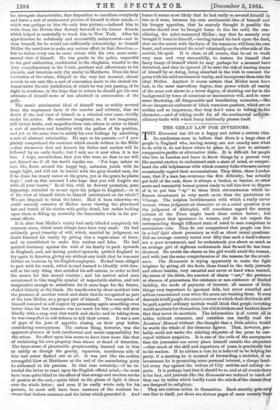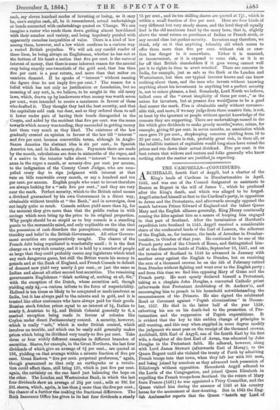THE GREAT LAW FOR INVESTORS.
THE Economist has hit on a happy and rather a curious idea. Its conductors seem to believe that there is a large class of people in England who, having money, are not exactly sure what to do with it, do not know where to place it, or how to estimate comparative profits or alternative risks. It is difficult for people who live in London and learn to know things by a process very like mental suction to understand such a state of mind, or compre- hend the odd helplessness with which country folks who save money occasionally regard their accumulations. They think, these London men, that if a man has overcome the first difficulty, has actually got hold of the cash, there is always a broker, or banker, or other acute and reasonably honest person ready to tell him how to dispose of it, to put him " up " to those little circumstances which in- fluence investment so very much more than the quotations on 'Change. The helpless bewilderment with which a really clever woman, whose judgment on character or on a social question is as the judgment of Ahitophel, will sometimes regard the money column of the Times might teach these critics better ; but they expect that ignorance in women, and do not expect the corresponding though different state of mind in men competent to accumulate coin. They do not comprehend that people can live in a half light about pecuniary as well as about moral questions. Tell an average country rector over fifty that such a bank's shares are a poor investment, and he understands you about as much as an average girl of eighteen understands that So-and-So has been divorced. He avoids the shares as the girl would avoid-the woman, and with just the same comprehension of the reasons for the avoid- ance. The Economist is trying apparently to make the light brighter by giving all the facts, those found in the daily journals and others besides, very essential and never at hand when wanted, the terms of the debts, the amount of shares "out," the presence or absence of guarantees, the existence or non-existence of limited liability, the mode of payment of interest, all manner of little things very important to ignorant folk, but never recorded and seldom remembered even when the acute are wanting them. It even descends totell people the exact counter at which their dividends will be paid, a point ordinary mortals would think that people investing would ascertain for themselves, but which brokers and bankers know that they never do ascertain. The information is of course all in tables without comment, and outsiders can hardly read the Investors' Manual without the thought that a little advice would be worth the whole of the tiresome figures. That, however, pro- bably could not under the existing etiquette of the press be con- veyed without suspicion. It is one of the evils of the anonymous that the journalist can never place himself outside the etiquettes —that much of the skill and experience of years is practically lost to his readers. If he advises a vote he is believed to be helping his party, if a meeting he is accused of forwarding a crotchet, if an investment he is promoting some personal interest, a charge level- led every day against the writers of City articles and railway re- ports. It is perhaps best that it should be so, and at all events there is the fact, and journals like the Economist are reduced to teach all they can by tables which hardly reach the minds of the classes they are designed to enlighten.
They are curious tables in themselves. Each security gets onl one line to itself, yet there are sixteen pages of some seventy each, say eleven hundred modes of investing or losing, as it -may be, one's surplus cash, all, be it remembered, actual undertakings or bonds connected with undertakings quoted on 'Change. We can imagine a rector who reads them down getting almost bewildered with their number and variety, and being hopelessly puzzled with apparently causeless inequalities of value. There is a kind of law among them, however, and a law which confirms in a curious way a rooted British prejudice. We will ask any candid reader of these lines, he being always an Englishman, whether he has not at the bottom of his heart a notion that five per cent, is the natural interest of money, that there is some inherent reason for the annual crop being exactly one-twentieth of the gold seed, that less than five per cent, is a poor return, and more than that rather an usurious demand. If he speaks of " interest " without naming the figure does he not imply five per cent. ? The reason for a belief which has not only no justification or foundation, but no meaning of any sort, is, we believe, to be sought in the old usury laws, which, drawn up by landowners when money was worth seven per cent., were intended to create a maximum in favour of those who drafted it. They thought they had the best security, and that the capitalists sold cash too dear, and so they ordered them to sell it lower under pain of having their bonds disregarded in the Courts, and aided by the accident that five per cent. was the mean towards which money was tending, they succeeded in getting money lent them very much as they liked. The existence of the law gradually created an opinion in favour of the law till " interest " and five per cent. became convertible terms, although in Anglo- Saxon America the abstract idea is six per cent., in Spanish ,America ten, and in India seventy-flue. Payments there are made by the month, calculations are done in sixteenths of the rupee, and if a native in the interior talks about " interest " he means an anna in the rupee a month, or seventy-five per cent. per annum, to the indignation of the County Court Judges, who are corn. polled every day to sign judgment with interest at that Tate on bills renewable every month, or say a hundred and ten per cent. per annum. English people who want to invest therefore are always looking for a "safe five per cent.," and they are very near the mark. Perfect security, which to the British mind means a dividend guaranteed by his own Government in a direct way, obtainable without trouble at "the Bank," and in sovereigns, does not imply quite so much. Consols seldom yield more than 3, for the moment they give more than that the public rushes in with savings which soon bring up the price to its original proportion. Why people should be so stupid as to buy consols is a standing puzzle to the mercantile mind, and only explicable on the idea that the possession of cash disorders the perceptions, creating at once timidity and belief in the British Government. All other Govern- ment securities are comparatively naught. The chance of the French debt being repudiated is wonderfully small ; it is the first charge on a very rich country, and it is held by a number of people so large that they could probably coerce any legislature which tried any such dangerous game, but still the Briton wants his money in pounds and, at the Bank of England, and French Consols in default of demand now yield very nearly 5 per cent., or just the same as Indian and almost all other second best securities. The remaining governments Englishmen "think nothing of, nothing at all, Sir," with the exception of the Dutch, whose securities sell, though yielding only 4k,—a curious tribute to the force of respectability. Holland is ten times as likely to be conquered or made insolvent as India, but it has always paid to the minute and in gold, and it is trusted like other customers who have always paid for their goods. Russian stock fetches prices equal to an interest of 5, Italian to nearly 8, Austrian to 8i, and British Colonial generally to 6, a marked exception being made in favour of colonies like Ceylon under direct Parliamentary control. A security, however, which is really "safe," which is under British control, which involves no trouble, and which can be easily sold generally makes prices which bring its dividend very nearly-to five per cent. Take three or four widely different examples in different branches of securities. Shares, for example, in the Great Northern, the last four dividends of which give an average of G per cent., are quoted at 136, yielding on that average within a minute fraction of five per cent. Great Eastern "five per cent. perpetual preference," again, though guaranteed so that only an earthquake or a revolu- tion could affect them, still bring 120, which is just five per cent. again, the certainty on the one hand just balancing the hope on the other. The London and Westminster Bank, in which the last four dividends show an average of 25i per cent., sells at 981. for 201. shares, which, again, is less thank more than the five per cent., the chance of a further rifle making the fractional difference. The Rock Insurance Office has given in its last four dividends a steady 75 per cent., and its ten shilling shares are quoted at 7i1., which is within a small fraction of five per cent. Here are four kinds of very different but very steady shares, and the level they all equally find is the old maximum fixed by the usury laws, that is, slightly above the usual return on purchases of Indian or French stock, or any second class but perfect security. Investors may therefore, we think, rely on it that anything tolerably old which seems to offer them more than five per cent. without risk or exer- tion has danger in it somewhere. Either it is unsound, or inconvenient, or it is exposed to some risk, or it is so far off that British shareholders if it goes wrong cannot well put it to rights in time to avert mischief. There are concerns in India, for example, just as safe as the Rock or the London and Westminster, but then our typical investor knows and can know nothing about them, and the man who invests without knowing anything about his investment in anything but a perfect security is, not to mince phrases, a fool. Somebody, Lord North we believe, talked once of the "sweet 'simplicity of three per cent.," as the axiom for investors, but at present five would:seem to be a good deal nearer the mark. Five is obtainable easily without unreason- able risk, and more, if we may judge from these massive lists, is not, at least by the ignorant or people without special knowledge of the concern they are supporting. There are undertakings named in the list which give dividends to make greedy mouths:water, mines, for example, giving 60 per cent. in seven months, an association which once gave 70 per cent., shopkeeping concerns yielding from 10 to 20 per cent., but there is risk, probably great risk, in them all, or the infallible instinct of capitalists would long since have raised the prices and run down their actual dividend. Five per cent. is the best return that widows and rectors and folks generally who know nothing about the matter are justified.in expecting.































 Previous page
Previous page